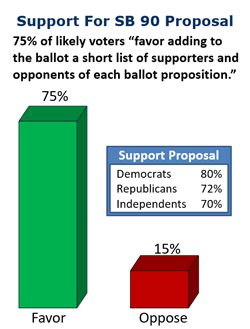 Prop. 15 is worthy test of 'clean money'
Proposition 15 would establish a pilot program for public financing of campaigns for secretary of state, but its more significant long-term impact might be the lifting of a 1988 voter-approved prohibition on public financing of local or state elections. "That," said Bob Stern, director of the Center for Governmental Studies in Los Angeles, a supporter of Prop. 15, "is the most important part of the initiative." As Stern noted, the measure would allow all cities and counties to decide for themselves whether they wanted to install the type of public financing that heretofore has been limited to charter cities such as San Francisco, Oakland and Sacramento. State legislators also could vote to extend public financing to other state offices. "We think that's the most important reason to vote no," said Richard Wiebe of the No on 14 campaign. He contends the "voters have spoken up loud and clear on this issue" when they defeated Proposition 89, promoted by the California Nurses Association in 2006. However, there were concerns specific to Prop. 89 - such as its attempt to tilt the playing field toward unions and against corporations on ballot measures - that do not exist in Prop. 15. The 2006 measure was a head-first and ideologically tilted dive into public financing; this latest initiative merely sanctions a test of public financing, with the possibility of expansion later. The beauty of Proposition 15 is that it targets an office that should be well insulated from fundraising dependence on parties and interest groups. Californians have seen what can go wrong when the secretary of state is not an honest broker. Democrat Kevin Shelley resigned in 2005 amid allegations of questionable campaign contributions and his workplace conduct. Proposition 15 would set up a system in which major-party candidates who could collect 7,500 contributions of $5 or more could qualify for public financing of their primary campaigns. The plan is modeled after voluntary "clean money" systems in other states that have found that candidates spend less time dialing for dollars and more time talking with the people they hope to represent. It was put on the ballot through a 2008 bill authored by Loni Hancock, a state senator from Berkeley who championed the clean-money cause during her Assembly tenure. It's a worthy experiment. Our only quibble is that it wasn't initiated with the insurance commissioner's office, which is peculiarly vulnerable to appearance of conflict when the parties directly regulated by the office (insurance companies) openly bankroll a candidate for office. One such industry stooge, Republican Chuck Quackenbush, resigned in disgrace in 2000. Funding for the pilot project for the secretary of state campaigns would be drawn from an increase on the fee of Capitol lobbyists to $700 every two years. Opponents warn that the fee could be unconstitutional - and, if it is invalidated, would require a tapping of the general fund, thus putting a strain on dollars otherwise spent on law enforcement, social services and other government priorities. However, even in that worst-case scenario, the several million dollars spent on a secretary of state campaign would be a tiny fraction of the California budget. We recommend passage of Prop. 15. See the article on San Francisco Chronicle website (In accordance with Title 17 U.S.C. Section 107, this material is distributed without profit to those who have expressed a prior interest in receiving the included information for research and educational purposes.) |




